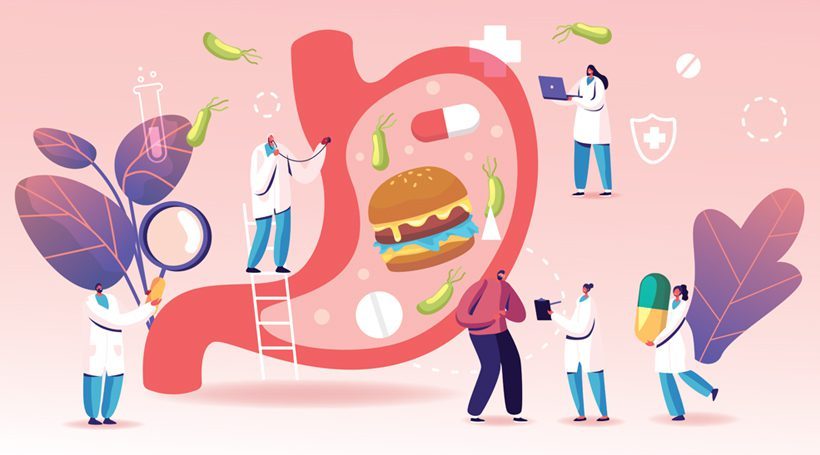As it turns out, getting that “gut feeling” may be more than just a figure of speech.
The gastrointestinal tract is critical to our health and well-being, meaning pesky GI symptoms can say a lot about your physical and emotional health. Let’s break it down.

Michael Goldstein, MD
Leaky gut – and all that comes with it
There was once a time when people kept stomach issues to themselves, but now, gut health has entered the mainstream.
“You see it all over social media and in the news. More and more people are experiencing GI issues, and they’re talking about one thing in particular – leaky gut,” says Virtua Gastroenterologist Michael Goldstein, MD.
If “leaky gut” doesn’t sound like a formal medical diagnosis, that’s because it’s not.
“There’s so much new and ongoing research on this because it’s technically a hypothetical condition, but something we see almost every day,” says Goldstein.
The basic concept, he says, is that the lining of the intestines becomes impaired, causing toxins to leak into the bloodstream. This can cause various symptoms, including bloating, gas, constipation, diarrhea, abdominal pain, fatigue, skin rashes and joint pain.
“It can lead back to any number of conditions – inflammatory bowel disease, celiac disease, arthritis, asthma and autoimmune diseases, just to name a few,” he says. “There are thousands of square feet of surface area along the intestinal tract, leaving a lot of opportunities for toxins to spread to different parts of the body.”
This can be caused by almost anything that damages the intestinal lining – underlying disease, radiation or chemotherapy, heavy alcohol intake or even stress.
“There’s something called the gut-brain microbiome access,” says Goldstein, “where what’s going on in other parts of your body – including your emotions – can affect your gut health.”
The gut links to the emotional and cognitive centers in the brain, so any disruption can lead to physical symptoms and emotional problems.
“Certain mental states signal to your body to create specific bacteria,” he says. “In times of fight or flight, or acute stress, bad bacteria become shortchanged in your gut, causing diarrhea, cramping or other stomach complaints. But it’s not all bad – your gut bacteria can also produce chemicals like serotonin, which can help fight mental health issues like depression.”
The gut links to the emotional and cognitive centers in the brain, so any disruption can lead to physical symptoms and emotional problems.

Drew Chiesa, DO
How to improve your gut health
The gut plays a vital role in digestion, immune system function and even mood regulation, which means maintaining your gut health is essential. How we go about maintaining gut health, though, will vary from person to person.
It all starts with your diet, says Drew Chiesa, DO, a gastroenterologist with Jefferson Health – New Jersey. A diet high in processed foods, high saturated fat and added sugars/artificial sweeteners can compromise the barrier lining of your gut. A plant-based diet that includes more fruits and vegetables and fermented foods, like kimchi and sauerkraut, offers excellent gut support.
Lifestyle changes can also make a significant impact on overall gut health.
“Reducing chronic high levels of stress through exercising, meditating and spending time with friends and family, for example, can make a difference,” says Chiesa. “It’s also important to get sufficient quality of sleep – the goal should be 7-8 hours of sleep per night.”
Sometimes though, people use supplements like prebiotics – specialized plant fibers that stimulate growth among the pre-existing good bacteria – and probiotics – living strains of bacteria that add to the population of good bacteria in your digestive system.
The problem, though, is that these supplements may not be as reliable as many think. While many studies attest to the ability of prebiotics and probiotics to increase immune responses and metabolic processes, the actual human studies “leave much to be desired,” says Chiesa.

Douglas Weinstein, MD
When things get serious
When GI symptoms are left untreated, they can quickly go from uncomfortable to critical, says Douglas Weinstein, MD, a Capital Health gastroenterologist and director of the hospital’s Advanced Gastrointestinal (GI) Motility Program.
Be on the lookout for any persistent symptoms – whether they stick around for a while or return frequently.
“Bleeding, abdominal pain, difficulty swallowing, nausea, vomiting, feeling full after small amounts of food, losing weight, bloating, feeling ‘stuck,’ and heartburn may be normal every once in a while, but if they stick around, it’s often a sign of something more serious,” says Weinstein, who specializes in treating gastroparesis, a problem in which the muscles in the stomach are unable to function properly.
The trouble is, GI symptoms can be caused by a variety of possible issues, so it may take a few tests to make an official diagnosis. And an earlier diagnosis often means less invasive treatment.
“On the other hand,” says Weinstein, “the longer you ignore symptoms, the more likely it is that we’ll have to perform treatments we could have avoided earlier.”
“People often put off getting treatment for these symptoms because they can be embarrassing to talk about with your doctor, but they can bring big consequences,” he says. “It affects people’s quality of life – their mental health, ability to hold a job, ability to socialize. Protecting that is worth a potentially embarrassing conversation.”














